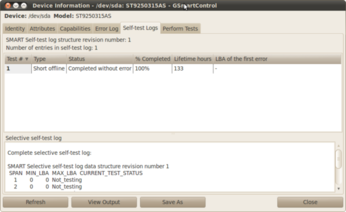Keep an Eye on Your Hard Disk's Health with GSmartControl

Productivity Sauce
SMART-capable hard disks are commonplace these days, and there are a few tools that can help you to use this technology to monitor the health of your hard disk. The smartmontools toolset, for example, lets you monitor and manage hard disks from the command line, while the GSmartControl utility can be used to keep a close eye on the hard disks. Despite its simple interface, GSmartControl is a rather capable tool that automatically reports and highlights any anomalies, performs short self-checks every four hours, and provides comprehensive info about the hard disks and their capabilities.
The best part is that GSmartControl makes it supremely easy to monitor your hard disk's health. When you launch the utility, it shows all the detected hard disks. Select the disk you want, and your should see the disk's health status in the Basic health check section. To access other GSmartControl features, double-click on the hard disk icon. This opens the Device Information window containing a wealth of information and additional features. The Perform Tests section, for example, lets you run short and extended hard disk tests, while the Attributes section provides an overview of the hard disk parameters and their current status. GSmartControl provides an extensive online help, so to view a detailed description of a specific item in the list, hover the mouse over it.
GSmartControl is available in the software repositories of many popular Linux distributions, so it can be installed using your distro's package manager. On Ubuntu, you can install GSmartControl using the sudo apt-get install gsmartcontrol command.
comments powered by DisqusSubscribe to our Linux Newsletters
Find Linux and Open Source Jobs
Subscribe to our ADMIN Newsletters
Support Our Work
Linux Magazine content is made possible with support from readers like you. Please consider contributing when you’ve found an article to be beneficial.

News
-
Parrot OS Switches to KDE Plasma Desktop
Yet another distro is making the move to the KDE Plasma desktop.
-
TUXEDO Announces Gemini 17
TUXEDO Computers has released the fourth generation of its Gemini laptop with plenty of updates.
-
Two New Distros Adopt Enlightenment
MX Moksha and AV Linux 25 join ranks with Bodhi Linux and embrace the Enlightenment desktop.
-
Solus Linux 4.8 Removes Python 2
Solus Linux 4.8 has been released with the latest Linux kernel, updated desktops, and a key removal.
-
Zorin OS 18 Hits over a Million Downloads
If you doubt Linux isn't gaining popularity, you only have to look at Zorin OS's download numbers.
-
TUXEDO Computers Scraps Snapdragon X1E-Based Laptop
Due to issues with a Snapdragon CPU, TUXEDO Computers has cancelled its plans to release a laptop based on this elite hardware.
-
Debian Unleashes Debian Libre Live
Debian Libre Live keeps your machine free of proprietary software.
-
Valve Announces Pending Release of Steam Machine
Shout it to the heavens: Steam Machine, powered by Linux, is set to arrive in 2026.
-
Happy Birthday, ADMIN Magazine!
ADMIN is celebrating its 15th anniversary with issue #90.
-
Another Linux Malware Discovered
Russian hackers use Hyper-V to hide malware within Linux virtual machines.

